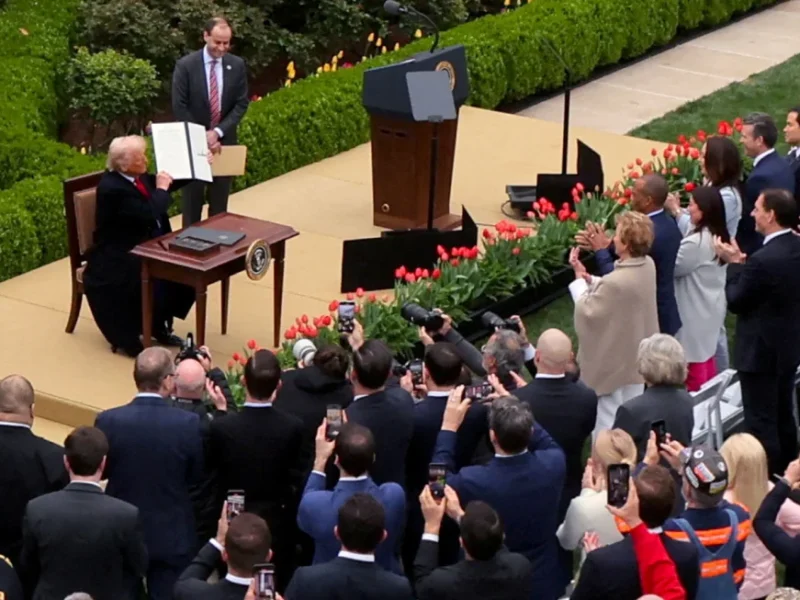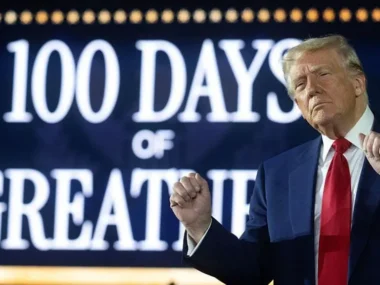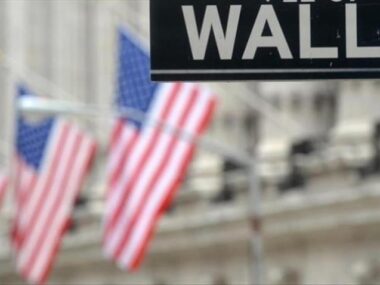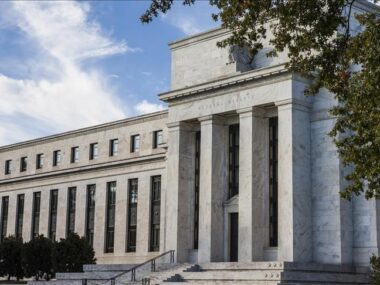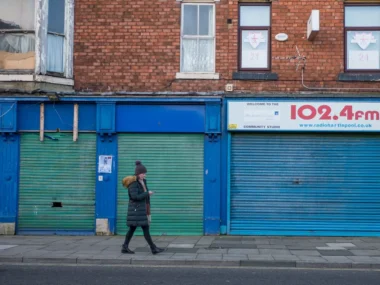Donald Trump has made the boldest economic gamble of any modern U.S. president.
Most leaders strive to maintain economic stability, especially when unemployment is low and growth is steady, as it was when he succeeded Joe Biden. However, Trump defied conventional wisdom by imposing sweeping tariffs on imports from 185 nations, disregarding expert advice and historical warnings.
Driven by his long-held belief that restricting foreign goods will boost domestic production, he ignored the risks of trade wars, which often end poorly and are more characteristic of the 19th century than today.
During a dramatic White House Rose Garden event, Trump clutched a large poster displaying new tariff rates as the wind threatened to carry it away. In a moment of unfiltered political theater, he placed a massive economic wager that could impact billions worldwide.

President Donald Trump speaks on tariffs in the White House Rose Garden, Washington, D.C., on April 2, 2025.
The biggest political surprise is that Trump, in an effort to revive post-industrial regions affected by job and factory losses to foreign competition, is about to cause real harm to Americans. He was elected just five months ago, largely due to voter frustration over high grocery and housing prices after inflation driven by COVID-19 and the Biden administration’s spending policies. Democratic nominee Kamala Harris had few answers for lowering prices, while Trump gained support by projecting blue-collar solidarity, even working the fries station at a McDonald’s in Pennsylvania.
However, he’s now fully committed to a policy that will make nearly everything more expensive — from fast food and electronics to cars and homes. The impact will be hardest on lower-income individuals, fixed-income retirees, and those seeing their 401(k) values drop.
Trump recently told NBC that he “couldn’t care less” if car prices skyrocket, and his new tariff policies seem to confirm this stance. It’s a bold political move for a billionaire president surrounded by fellow billionaires and millionaires.
Foreign nations are almost certain to retaliate.
The outcome of this gambit is unpredictable. If all tariffs are fully enforced without last-minute changes — a possibility given Trump’s history of reversals — the world could face a full-scale trade war.
Foreign leaders, like Trump, are influenced by political pressures, and they will likely face strong demands to retaliate against the U.S. for imposing a universal 10% tariff on nearly all countries, with even higher rates for those Trump deems the worst offenders.
Australia, one of the U.S.’s closest allies, has already expressed dismay. Prime Minister Anthony Albanese stated, “This is not the act of a friend.” Retaliation could trigger an escalating series of responses, potentially leaving Trump, who is known for wanting the final word, with little choice but to respond. The president has not explained why the U.S. should impose tariffs on small, struggling nations like Cambodia or why it makes sense to target developing countries in Africa. He has even included remote territories, like the Heard and McDonald Islands in Antarctica, which will face a 10% tariff, despite being a sanctuary for seabirds.
Another significant political risk is that Trump’s strategy could dismantle the global free trade system the U.S. spent decades building, with no immediate political rewards.
Many analysts argue that the promise of manufacturers relocating to the U.S. is unrealistic. Even if some did, it is unlikely that such changes would occur during Trump’s term or even a hypothetical third term.
While tariffs may generate billions for the U.S. Treasury, it’s uncertain whether voters will accept his claim that these funds will offset the higher prices they face — effectively acting as a new tax. Moreover, there are signs that his proposed tax cuts would disproportionately benefit the wealthiest Americans.
An examination of Trump’s image as a rebellious entrepreneur.
Trump’s bold announcement of “Liberation Day” on Wednesday leaves little room for doubt about his audacity.
For weeks, he’s alternated between threatening tariffs and hinting at backtracking. His supporters in Congress have echoed the familiar belief that his tough talk is part of a larger strategy from a skilled dealmaker. However, unless there’s a major reversal, which would be seen as a significant political setback, given his framing of this as a “historic” moment for America, Trump is standing firm this time.
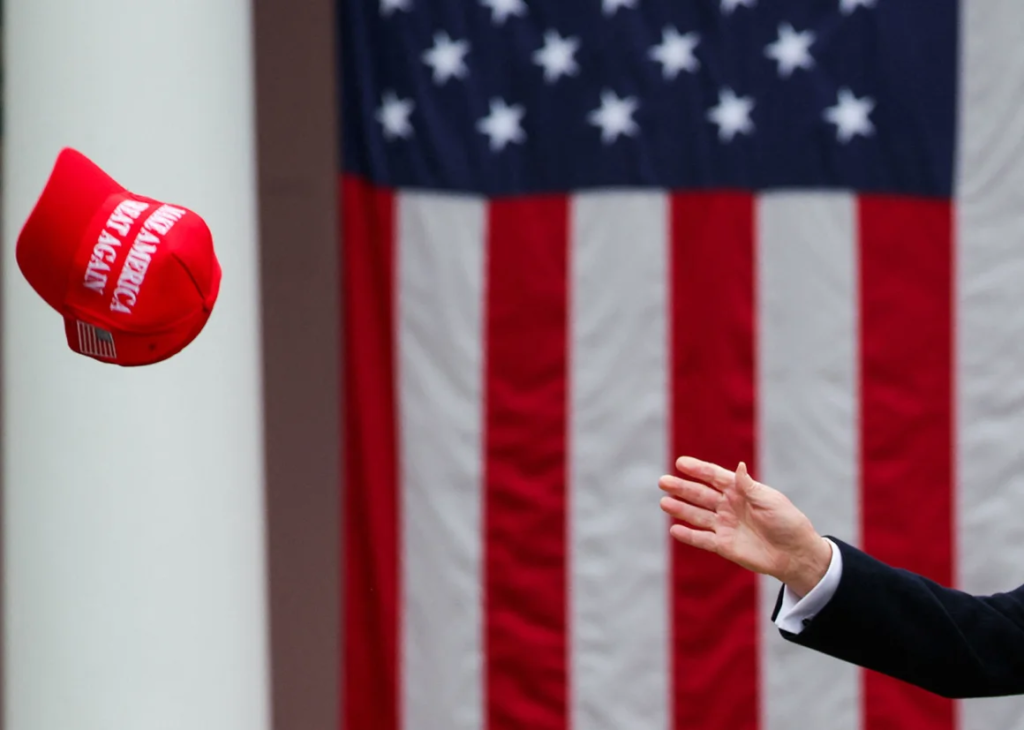
On April 2, 2025, President Donald Trump attempts to grab a MAGA hat during his remarks on tariffs in the Rose Garden at the White House in Washington, DC.
“This will be a very significant moment. I believe you’ll remember today,” Trump told Cabinet members and congressional leaders. “It’s a day that, hopefully, in years to come, you’ll look back on and say, ‘He was right. This became one of the most pivotal days in our nation’s history.’”
Trump’s belief that he’s marking a turning point is likely accurate: Some economists warn that a return to trade barriers reminiscent of those leading to the 1930s Great Depression could trigger a recession.
“This is, in my view, one of the most crucial days in American history. It’s our declaration of economic independence,” said the president. However, his usual hyperbole could backfire on him this time.
Still, Trump has a loyal base that shares his distrust of experts and mainstream economists. His argument that America has been taken advantage of globally helped secure his victories in two elections.
As he put it on Wednesday, “For decades, our country has been looted, pillaged, raped, and plundered by nations both near and far, friends and foes alike.” He continued: “American steelworkers, auto workers, farmers, and skilled craftsmen have suffered deeply. They’ve watched in distress as foreign leaders stole our jobs, foreign cheats ransacked our factories, and foreign scavengers dismantled our once great American dream.”
Trump’s two terms underscore that the advantages of globalization haven’t been evenly distributed. Many of the swing states he won in 2016 and 2024 bear the scars of industrial decline. Voters there recall promises from past presidents and feel betrayed.
“In the coming days, there will be backlash from globalists, outsourcers, special interests, and the fake news,” Trump warned his White House audience and supporters at home. “But remember, every trade prediction from our opponents over the past 30 years has been completely wrong.”
If Trump challenges economic norms and revitalizes struggling regions, his unorthodox beliefs will be vindicated, cementing his legacy.
Sen. Tommy Tuberville explained that his constituents continue to trust the president. “They believe in him, and he’s trying something different. We need a new approach,” said the Alabama Republican and former Auburn football coach. “We can’t keep going with the same old strategy; eventually, we have to change the game, and that’s what he just did.”
A potential opportunity for Democrats if things don’t go as planned.
The economic situation is far more complex than a college football playbook.
One reason the U.S. has often had lower tariffs than its competitors is due to the strength of its consumer base, the wealth of its economy, and the idea that a free trade system, with the U.S. as the dominant power, enhances the country’s influence.
However, it’s now going to be much harder for Americans to afford items like new cars, flat-screen TVs, and even basic groceries. If prices rise and inflation surges, consumers might reduce spending, which could slow growth and trigger a recession — a scenario that would give Democrats a political advantage. Footage from Trump’s Rose Garden address could be featured in countless campaign ads during the 2026 midterms and the 2028 elections. Trump’s “Liberation Day” comes at a time when recent turmoil may be turning voters against Republicans. In one of the early political tests of his second term, a liberal candidate easily won a crucial election in Wisconsin that determined the future of the state Supreme Court, marking a clear rejection of Trump and his ally, Elon Musk.
The Democratic Party, which has struggled to find an effective counter to Trump, now has a golden opportunity after the spectacle of his tariff announcement.
“This is a huge tax on American families, all to help billionaires get a tax cut,” said Democratic Senate Minority Leader Chuck Schumer.
Some Republicans might agree. Four Republican senators voted with Democrats in a symbolic move to block tariffs on Canada.
Regardless of whether the country is heading toward an economic collapse or the promised golden age, Trump’s party — and every American — is along for the ride.

